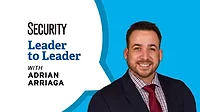Transitioning from Public to Private Sector Retail Security
What skills do you need to survive in a today’s demanding security market, including retail security?
How can you transition from the public to security private sector?
What you should expect from the private sector and what does the private sector expect from you?
How can you develop your personal brand and professional iProfile?
Where do you look for security related jobs?
Dennis Quiles, Director of Global Security for McDonald’s Corporation, answered all of those questions and more, during a webinar titled Transitioning from Public to Private Sector Retail Security.
Dennis, a U.S. Army veteran, is director of global security services at McDonald’s Corporation, where he has served for the last 18 years. His role includes all functions for physical security for the corporate and satellite offices with 52 security managers around the world. A 34-year veteran of the protection business, he is an acknowledged professional in security, in the fields of hospitality, corporate security and casino surveillance.
According to Quiles, the demand for security professionals will increase 14% over the next seven in a market where there is a shortage of qualified individuals. Those who are the most qualified will fill the jobs first, he said. “If you want to remain relevant to the job you want, you must be able to adjust to the industry demands,” Quiles said. “Job seeking candidates from the military or law enforcement have to develop skills, expertise that is second to none because of their specialized training. For the retail sector, skills required include communication skills, decision making abilities, writing skills, investigative skills and more. Don’t wait to acquire knowledge. Take control of your career today. Start building your security career today.”
Corporate security is heading down a road filled with many changes of security for business, he said, and one of the most prominent will be an increase in the complexity of security, so budget management and business continuity will be key areas. The lesson learned is that security professionals must be business savvy and learn how to speak the business language.
What does that mean? Speak the language of business to reach the CEO’s suite, he said. Get out of your silos and participate in business meetings, he said.
Quiles also suggested associating oneself with trade organizations. “Ray Kroc said the two most requirements for success are being in the right place at the right time and doing something about it. Associations provide information on industry trends and the industry pulse, and they offer networking opportunities so that you can be connected with security professionals who are doing what you are doing or what want to do.”
“Don’t silo yourself and be good for one thing only,” Quiles added. “Stay away from the guards, guns and gates mentality and become an overall and all-around business partner.”
Quiles suggested that CPP certification can also help you enhance your knowledge and boost your resume. The CPP is recognized worldwide, and provides proof of individuals’ knowledge and expertise. For retail specifically, Quiles suggested seeking a loss prevention certification as an opportunity to certify what you are already doing or what you would like to do.
Quiles added that professional branding is your personal brand; it’s what is authentic to you. “A personal brand is the total experience of someone having a relationship with you are and what you represent as a leader. Branding is about the image. Don’t limit your profile to a paper resume. Enhance it with social media, as people who are looking for security professionals will look at those web sites first. The security industry expects you to be a professional. Take a look at your social media pages and delete the content that could send the wrong message to prospective job recruiters.
To end, Quiles suggested the following:
- If you want to succeed, you have to have the right skills for the job you want
- Build your personal branding and develop your network. The cyber world is the first place your recruiter will look. There are no second changes for first impressions.
- Be, do and know. Be prepared for the job you want. Do show that you are prepared to distinguish yourself among the competition.
View the webinar on demand here: http://www.securitymagazine.com/events/1111-transitioning-from-public-to-private-sector-retail-security
Looking for a reprint of this article?
From high-res PDFs to custom plaques, order your copy today!







